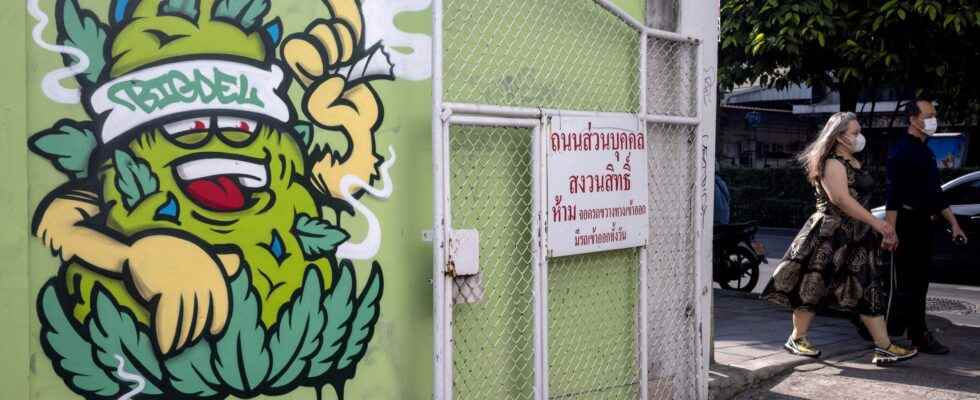Jump, a 27-year-old IT guy who looks like a teenager, installed his weed truck, a brightly colored “weed van” dubbed Dank (“excellent”, in English slang for “smoker”) in Sukhumvit 11, one of Bangkok’s tourist streets. On a side display are lined up cannabis products: chocolate cakes, oils, coffees and a whole range of weed, dried flowers ready to be rolled into a joint. “A very lucrative business, rejoices Jump. Most of my customers, foreign tourists, come to buy THC products. [NDLR : le tétrahydrocannabinol, composant psychoactif et addictif du cannabis]. There are the amateurs who simply want to smoke to relax and the ‘pros’ who know all the varieties.” The young man acknowledges with a smile that the levels of his cannabis greatly exceed the legal ceiling of 0.2%. “The police comes from time to time to check my operating license, nothing more,” he adds.
By removing cannabis from the list of narcotics in June 2022, Thailand, for a long time one of the most severe countries in terms of drug trafficking and consumption (possession of cannabis was punishable by a fifteen-year prison sentence ) became one of the most tolerant. And even if the products marketed outside the medical framework should in theory contain only traces of THC and it is forbidden to smoke cannabis in public spaces, the characteristic scents constantly float in the tourist streets.
This decriminalization materializes a 2019 campaign promise – made by a party, now an ally of the generals in power – on the liberalization of cannabis for therapeutic use, in the form of cannabidiol (CBD), a non-addictive component of cannabis, with the effects soothing. It is part of a campaign to make Thailand a haven for wellness and medical tourism. The objective is also to allow many small producers, ruined by the Covid crisis, to cultivate, manufacture and distribute products containing CBD.
A market which, within two years, could reach 1.2 billion dollars annually, according to calculations by the University of the Thai Chamber of Commerce. “If we have the right approach, cannabis is gold,” said Anutin Charnvirakul, the Minister of Health, behind the project.
A booming market
In no time, thousands of Thais have started. The government has opened lines of credit and distributed over a million seeds. In early January, the Weed in Thailand site listed 2,544 cannabis businesses in tourist locations, from simple shops to five-star spa salons, including weed trucks and the coffee shops. If some of these businesses stick to the law by confining their offer to the CBD range, many offer illegal euphoric products. A very attractive offer for tourists returning after three years of absence imposed by the health crisis.
This new market has also whetted the appetite of large conglomerates. Food giant Charoen Pokphand has started selling cannabis edibles and drinks in its 12,000 convenience stores. And power generation group Gunkul Engineering has invested nearly $60 million in a cannabis plantation and processing unit.
But the legal vagueness on how to consume has raised an outcry from associations of doctors and Buddhist clergy. “The government has a responsibility to educate the public,” insists Gloria Lai, regional director of the International Drug Policy Consortium, a network of NGOs. While legislative elections are scheduled for next May, several parties are demanding a stricter rewrite of the legislation, or even the re-registration of the plant on the list of narcotic products.
But that’s unlikely. “Many Thais have embarked on the production of cannabis. If the legislation goes back, what would become of them?” Asks Kajkanit Sakdisubha, owner of Taratera, a laboratory specializing in the extraction of cannabis components. Jump, the boss of the weed truck Dank believes, however, that measures should be taken “to better supervise the youth”. Cannabis is prohibited for those under 20, but this rule is as light as hovering smoke…
